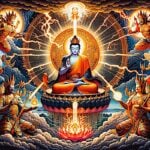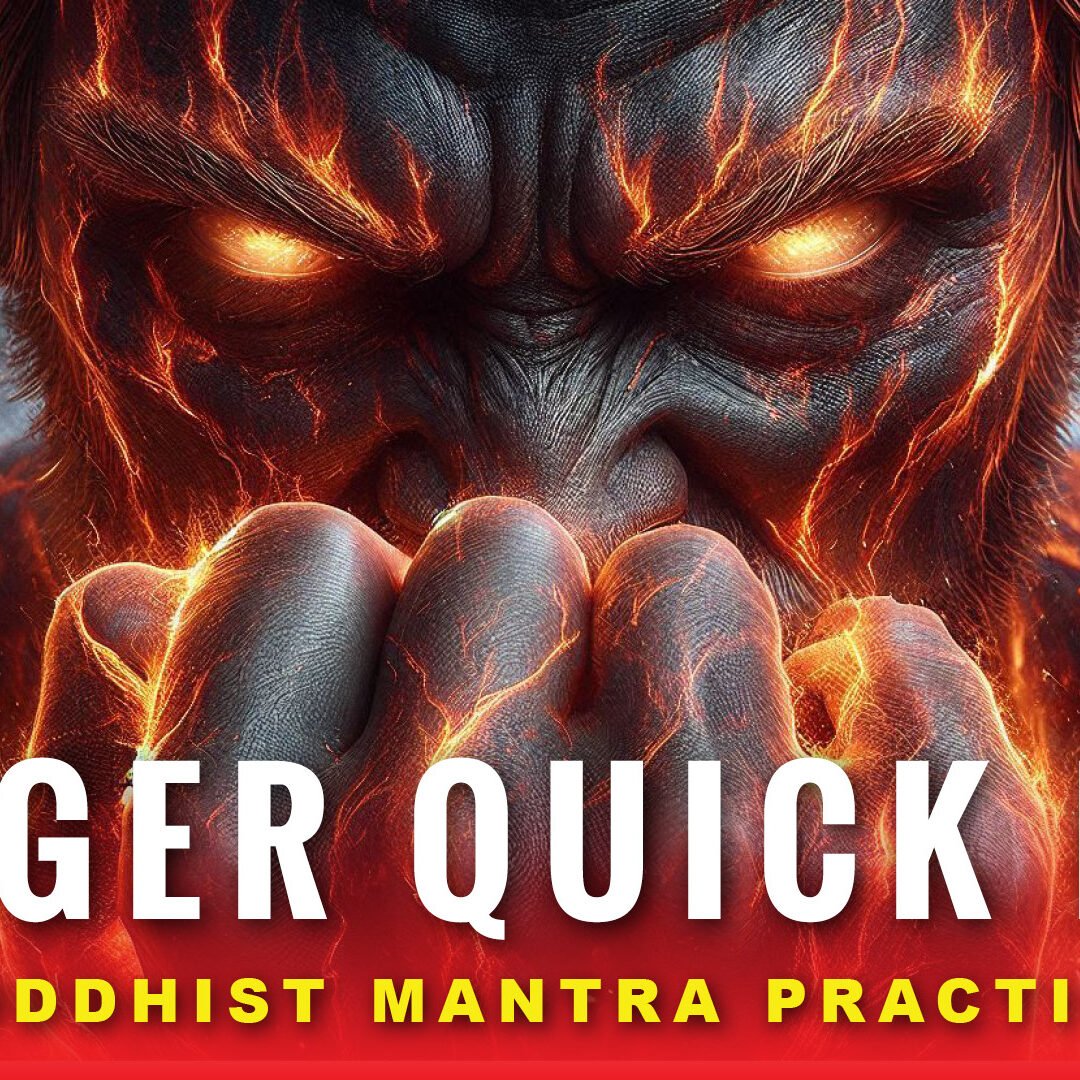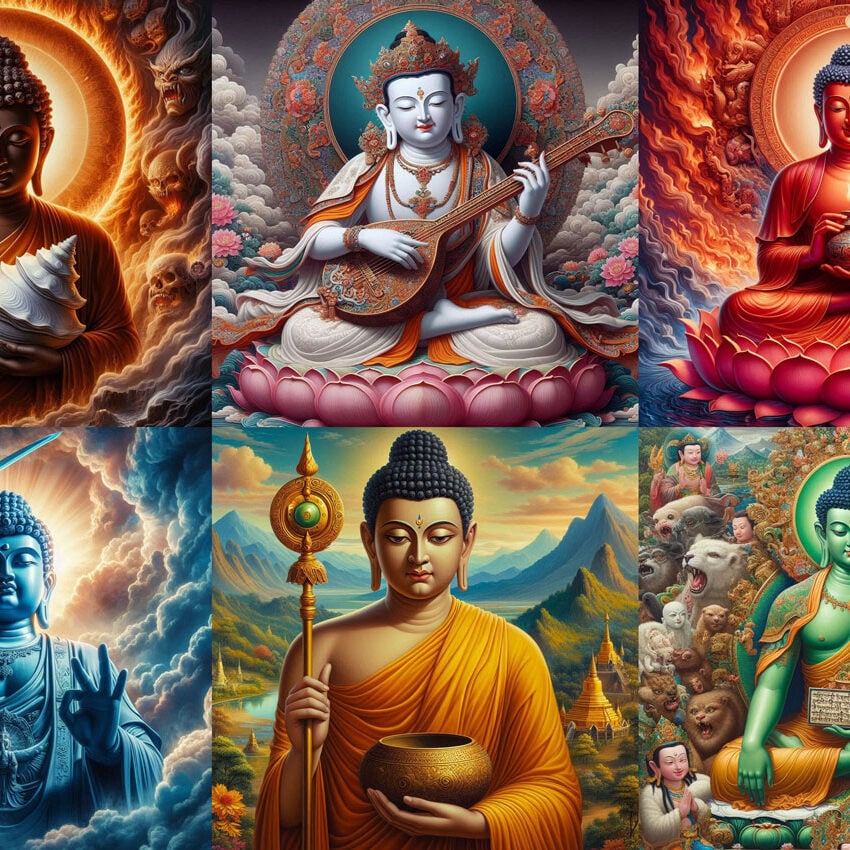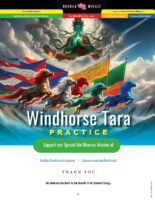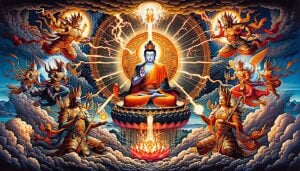VIDEO MANTRA: Heart Sutra and Unsurpassed mantra 1 Hour Chanted 10 times in Sanskrit – Protects & Purifies

Heart Sutra — together with The Supreme Mantra in the Heart Sutra — is recited around the world for protection and removal of negative karma. It is the heart essence teaching of the Perfection of Wisdom Sutras, as transmitted by Buddha.
Chant along (or listen) to the peerless Heart Sutra and Supreme Mantra in sacred Sanskrit, the Prajñāpāramitāhṛdaya, followed by the Maha Vidya Mantra, the unsurpassed mantra: ’gate gate paragate parasamghate bodhi svaha’. Chant or listen Daily for Wisdom, Compassion, Blessings.
VIDEO:
It is both the supreme mantra and the supreme teaching in Mahayana Buddhism. In part it is an aspiration — we aspire to comprehend the true wisdom, which can take a lifetime for many of us. Meanwhile, though, as we chant, we purify our negative karma, generate merit and wisdom. In times of disasters, many practitioners ask Sangha to chant this Sutra, but it is also a daily practice for most Buddhists.
In Monasteries and temples all over Japan, Korea, Vietnam, Tibet, Mongolia, Bhutan, China, parts of India and Nepal, the Americas and Europe the Heart Sutra is a main practice for overcoming disasters, the negative karma of people and even countries.
In Mahayana Temples, Heart Sutra is universally a daily practice, chanted in Sanskrit and dozens of other languages, although the benefits of the original Sanskrit — as transmitted by Avalokiteshvara in Sutra, and sealed by Shakyamuni Buddha — have the greatest merit and benefits.
Benefits of Recitation or Listening
- Overcomes obstacles for current and future endeavours.
- Protects from evil, spirt harm
- Purifies bad karma from your actions
- Generates “skies of merit”
Download the 21-Page PDF courtesy of Buddha Weekly with lyrics, translations, pronunciation tips and commentary here: https://buddhaweekly.com/?p=24010
MUSIC AVAILABLE FOR STREAMING on Spotify, Apple Music, iTunes, Instagram/Facebook, TikTok & other ByteDance stores, YouTube Music, Amazon, Pandora, Deezer, Tidal, iHeartRadio, Claro Música, Saavn, Boomplay, Anghami, NetEase, Tencent, Qobuz, Joox, Kuack Media, Adaptr, Flo, MediaNet.
ON SPOTIFY: https://open.spotify.com/album/0JjiIS6cjASfBfaT51tCC1
TO RECITE IN ENGLISH, watch our short English Heart Sutra recitation video which includes an introduction to the benefits: https://www.youtube.com/watch?v=9Yvs8B9KQjU
Oṁ! Namo Bhagavatyai Ārya-Prajñā pāramitāyai!
Hail! Reverence to the Fortunate and Noble Perfection of Wisdom
Heart Sutra
Ārya-Avalokiteśvaro Bodhisattvo,
The Noble Buddha-to-be Avalokiteśvara,
gambhī rāṁ prajñā pāramitā caryāṁ caramāṇo,
while dwelling deep in the practice of the perfection of wisdom,
vyavalokayati sma panca-skandhā
beheld these five constituent groups (of mind and body)
tāṁś ca svabhā vaśūnyān paśyati sma.
and saw them empty of self-nature.
Iha, Śāriputra, rūpaṁ śūnyatā, śūnyata iva rūpaṁ;
Here, Śāriputra, form is emptiness, emptiness is surely form;
rūpān na pṛthak śūnyatā, śunyatāyā na pṛthag rūpaṁ;
emptiness is not different from form, form is not different from emptiness;
yad rūpaṁ, sā śūnyatā; ya śūnyatā, tad rūpaṁ;
whatever form there is, that is emptiness; whatever emptiness there is, that is form.
Evam eva vedanā-saṁjñā-saṁskāra-vijñā nāni
the same for feelings, perceptions, volitional processes and consciousness.
Iha, Śāriputra, sarva-dharmāḥ śūnyatā-lakṣaṇā,
Here, Śāriputra, all things have the characteristic of emptiness,
anut pannā, ani ruddhā; amalā, na vimalā; nūnā, na paripūrṇāḥ.
no arising, no ceasing; no purity, no impurity; no deficiency, no completeness.
Tasmāc Śāriputra, śūnyatā yāṁ
Therefore, Śāriputra, in emptiness
na rūpaṁ, na vedanā, na saṁjñā, na saṁskārāḥ, na vijñānami;
there is no form, no feeling, no perception, no volitional processes, no consciousness;
na cakṣuḥ-śrotra-ghrāna-jihvā-kāya-manāṁsi;
there are no eye, ear, nose, tongue, body or mind;
na rūpa-śabda-gandha-rasa-spraṣ ṭavya-dharmāḥ;
no forms, sounds, smells, tastes, touches, thoughts;
na cakṣūr-dhātur yāvan na mano vijñāna-dhātuḥ;
no eye-element (and so on) up to no mind-consciousness element;
na vidya, na avidyā, na avidyā-kṣayo, na avidyā-kṣayo, yāvan na jarā-maraṇam, na jarā-maraṇa-kṣayo;
no ignorance, no destruction of ignorance (and so on) up to no old age and death, no destruction of old age and death;
na duḥkha-samudaya-nirodha-mārgā;
no suffering, arising, cessation, path;
na jñānam, na prāptir aprāptivena.
no knowledge, no attainment, no non-attainment.
Bodhisattvasya
Therefore, Śāriputra, because of the Buddha-to-be’s non-attainments
Prajñā pāramitām āśritya, viharaty acittā varaṇaḥ,
he relies on the Perfection of Wisdom, and dwells with his mind unobstructed,
cittā varaṇa-nāstitvād atrasto,
having an unobstructed mind he does not tremble,
viparyāsa-atikrānto, niṣṭhā-Nirvāṇa.
overcoming opposition, he attains the state of Nirvāṇa.
Tryadhva-vyava sthitāḥ sarva-Buddhāḥ
All the Buddhas abiding in the three times
Prajñā pāramitām āśritya
through relying on the Perfection of Wisdom
anuttarāṁ Samyak sam bodhim abhisam buddhāḥ.
fully awaken to the unsurpassed Perfect and Complete Awakening.
Tasmāj jñāta vyo Prajñā pāramitā mahā-mantro,
Therefore one should know the Perfection of Wisdom is a great mantra,
mahā-vidyā mantro, ‘nuttara-mantro, samasama-mantraḥ,
a great scientific mantra, an unsurpassed mantra, an unmatched mantra,
sarva duḥkha praśa manaḥ, satyam, amithyatvāt.
the subduer of all suffering, the truth, not falsehood.
Prajñā pāramitā yām ukto mantraḥ tad-yathā:
In the Perfection of Wisdom the mantra has been uttered in this way:
gate, gate, pāragate, pārasaṁgate, Bodhi, svāhā!
gone, gone, gone beyond, gone completely beyond, Awakening, blessings!
More articles by this author
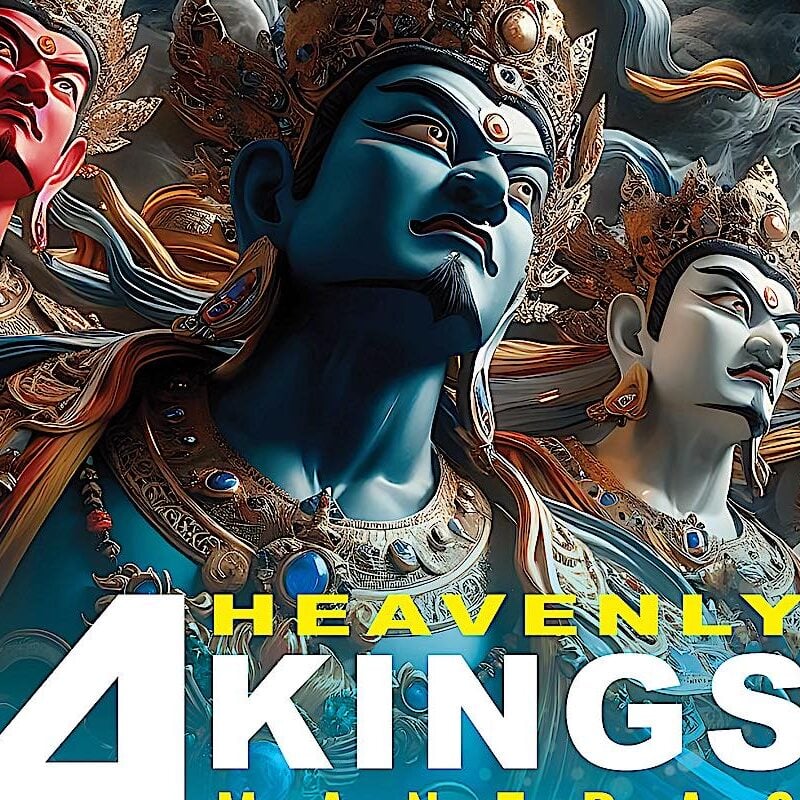
NEW MUSIC ALBUM! Four Heavenly Kings: Mantras Chanted in Sanskrit for Good Fortune, Protection, Harmony and Wisdom

4 Guardians of the World and Dharma: the Watchers of the World: the Four Heavenly Kings in Buddhism, Their Mantras and Practice
Search
Latest Features
Please support the "Spread the Dharma" mission as one of our heroic Dharma Supporting Members, or with a one-time donation.
Please Help Support the “Spread the Dharma” Mission!

Be a part of the noble mission as a supporting member or a patron, or a volunteer contributor of content.
The power of Dharma to help sentient beings, in part, lies in ensuring access to Buddha’s precious Dharma — the mission of Buddha Weekly. We can’t do it without you!
A non-profit association since 2007, Buddha Weekly published many feature articles, videos, and, podcasts. Please consider supporting the mission to preserve and “Spread the Dharma." Your support as either a patron or a supporting member helps defray the high costs of producing quality Dharma content. Thank you! Learn more here, or become one of our super karma heroes on Patreon.
Lee Kane
Author | Buddha Weekly
Lee Kane is the editor of Buddha Weekly, since 2007. His main focuses as a writer are mindfulness techniques, meditation, Dharma and Sutra commentaries, Buddhist practices, international perspectives and traditions, Vajrayana, Mahayana, Zen. He also covers various events.
Lee also contributes as a writer to various other online magazines and blogs.






